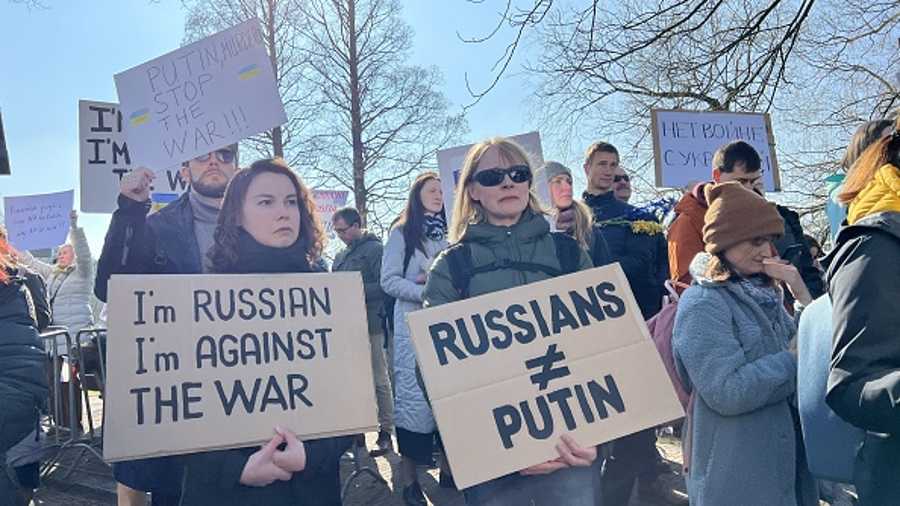After almost eight hours sitting in a police station and court, Vera Kotova became one of the first people to be judged and fined just under $240 under a new Russian law to punish anyone deemed to have discredited the armed forces.
Her crime was writing “No to war” accompanied by a heart in the snow at the foot of a statue of Soviet state founder Vladimir Lenin in a square in the Siberian city of Krasnoyarsk during a sparsely attended protest rally.
Her punishment, decided by the central district court of Krasnoyarsk, was the 30,000 rouble fine, which she is appealing. The incident went viral on local media and the Telegram messaging app., helped by a video of an unidentified policeman using his foot to rub away the phrase that is now banned in Russia.
“It was one of the first cases under the so-called military censure law about discrediting the army, one of the first court rulings, literally because a person wrote their opinion in the snow, just two words,” said Kotova’s lawyer, Vladimir Vasin.
The phrase “no to war” in Russian is “nyet voinye”.
The Kremlin did not immediately respond to a request for comment. Contacted late in the day after working hours, the Krasnoyarsk police were not available for comment and the local court could not be reached.
On March 4, Russia’s parliament passed a law making public actions aimed at “discrediting” Russia’s army illegal and banning the spread of fake news, or the “public dissemination of deliberately false information about the use of the Armed Forces of the Russian Federation”.
Kotova was fined the 30,000 roubles ($239) but she has yet to pay it, pending appeal. The average monthly wage in Russia is 78,000 roubles ($621).
But she and several other protesters say they fear they have put their and their families’ jobs at risk by protesting or expressing doubts over the war, underlining the growing self-censorship the new laws have forced on Russians.
Speaking from Krasnoyarsk, Vasin told Reuters that “because of those words, as everyone can see, those people who do that are getting arrested...Under the new law, those words are banned. The court does not rule in favour of a person who writes two simple words in the snow”.
He said a few days before Kotova’s case, two women were fined 150,000 roubles because they had gone for a walk in a square with one wearing a face mask with the phrase on it.
Nuclear power plants at Chernobyl managed by Ukraine staff
The Ukrainian nuclear power plants at Chernobyl and Zaporizhzhia, both now under the control of Russian forces, are being run and managed by their Ukrainian staff, Russia’s atomic energy agency Rosatom said on Saturday, according to the RIA news agency.
Rosatom’s statement said an external power supply was being restored to the defunct Chernobyl plant, site of the world’s worst nuclear accident in 1986, with the help of Russian specialists.
It also said activities to ensure safety at the plants were being carried out in coordination with the International Atomic Energy Agency.
Ukraine had warned of an increased risk of a radiation leak from Chernobyl if its high-voltage power line, damaged in fighting, was not repaired.










